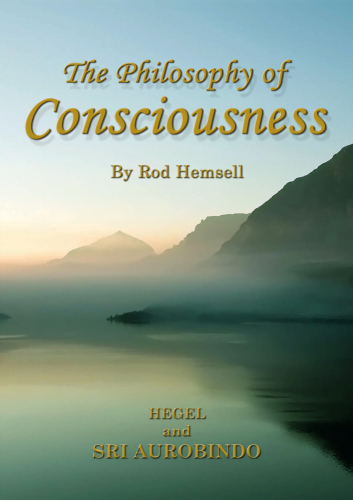The Philosophy of Consciousness: Hegel and Sri Aurobindo

The Philosophy of Consciousness:
Hegel and Sri Aurobindo
An investigation into the nature and evolution of consciousness through the lens of various philosophers, culminating with the experiential philosophy of Sri Aurobindo.
Book Details
Author: Rod Hemsell
Print Length: 197 pages
Publisher: Auro e-Books
Original source: University of Human Unity
Contributors: Blindshiva
Book format: PDF, ePub, Kindle
Language: English
Book Download
Contents
PREFACE
INTRODUCTION
PART I – FROM EPISTEMOLOGY TO PHENOMENOLOGY
- Lecture 1
- Lecture 2
- Lecture 3
- Lecture 4
PART II – FROM SCIENCE TO COSMOLOGY
- Lecture 5
- Lecture 6
- Lecture 7
- Lecture 8
PART III – HEGEL AND SRI AUROBINDO
- Lecture 9
- Lecture 10
- Lecture 11
- Lecture 12
SUPPLEMENT – SAVITRI AND THE PHILOSOPHY OF CONSCIOUSNESS
- 1
- 2
About the Author
Sample
The Philosophy of Consciousness
Why do we do philosophy? The purpose of philosophy is to realize the Good, the True, the Beautiful–Wisdom, Happiness, liberation from ignorance. Philosophy is not an academic game. Philosophy is a human activity of the very highest level. It attempts to integrate this individual organism with that universal plane of existence that contains all potentialities in their perfect, absolute forms, the forms of the Idea. That plane of potentialities is known as Sambhogakaya in Buddhism; in Christianity it is the Word, the Logos, the Divine Mind. In Hinduism it is the Divine Mother, the Mahashakti, Mahat. In Buddhism this trinity of the transcendent, the universal, and the individual planes of existence is known as Dharmakaya, Sambhogakaya, Nirmanakaya. In Sri Aurobindo’s philosophy the highest is the Self, Atman, Purushottama, the middle is the Mahashakti, Divine Supermind, Mahat, and the third is the Soul, Jivatma. We are all embodiments of these three principles. In Christianity this trinity is named Father, Son, Holy Spirit. This is a common universal understanding in all systems of ancient wisdom. Sri Aurobindo often speaks of the Transcendent, the Universal, and the Individual. Basing his philosophy on the Isha and Kena Upanishads he says that the individual must universalize himself in order to know the Transcendent. It cannot be known directly. The transcendent is the Unknowable. But it can be known through its powers of manifestation: Beauty, Truth, Love, Harmony, Order, Perfection. If we know those then through them we can get a glimpse of their unlimited, unknowable origin which can never be known in itself. We can’t know That. It is unknowable. So in the Kena Upanishad, the gods, Indra, Vayu, Agni are all asking ‘Who is this origin of my mind, my life, my energy? Who is this that is the speech of my speech, the mind of my mind, the life of my life?’ The god Agni, who is the energy of every form, the knower of every birth, cannot answer the question, “what is its own origin?”. It’s something beyond. Vayu, the life-force itself, cannot answer the question. Even the highest mind of illumination, Indra, cannot know its own origin, because it is unknowable. Even his incomparable illumination of knowledge has an origin beyond itself. Even these universal beings know they are not the origin of their own forces. And they are struggling to answer this question. So they turn to the Divine Mother, and she lifts her finger and indicates the beyond. And then they see. But even those ultimate powers and principles can’t enter into That. The Upanishad says therefore, if we turn these energies in us toward their origin, then we can know That through them. And this frees us from the limitations of relative existence.
…

Leave a Reply
Want to join the discussion?Feel free to contribute!